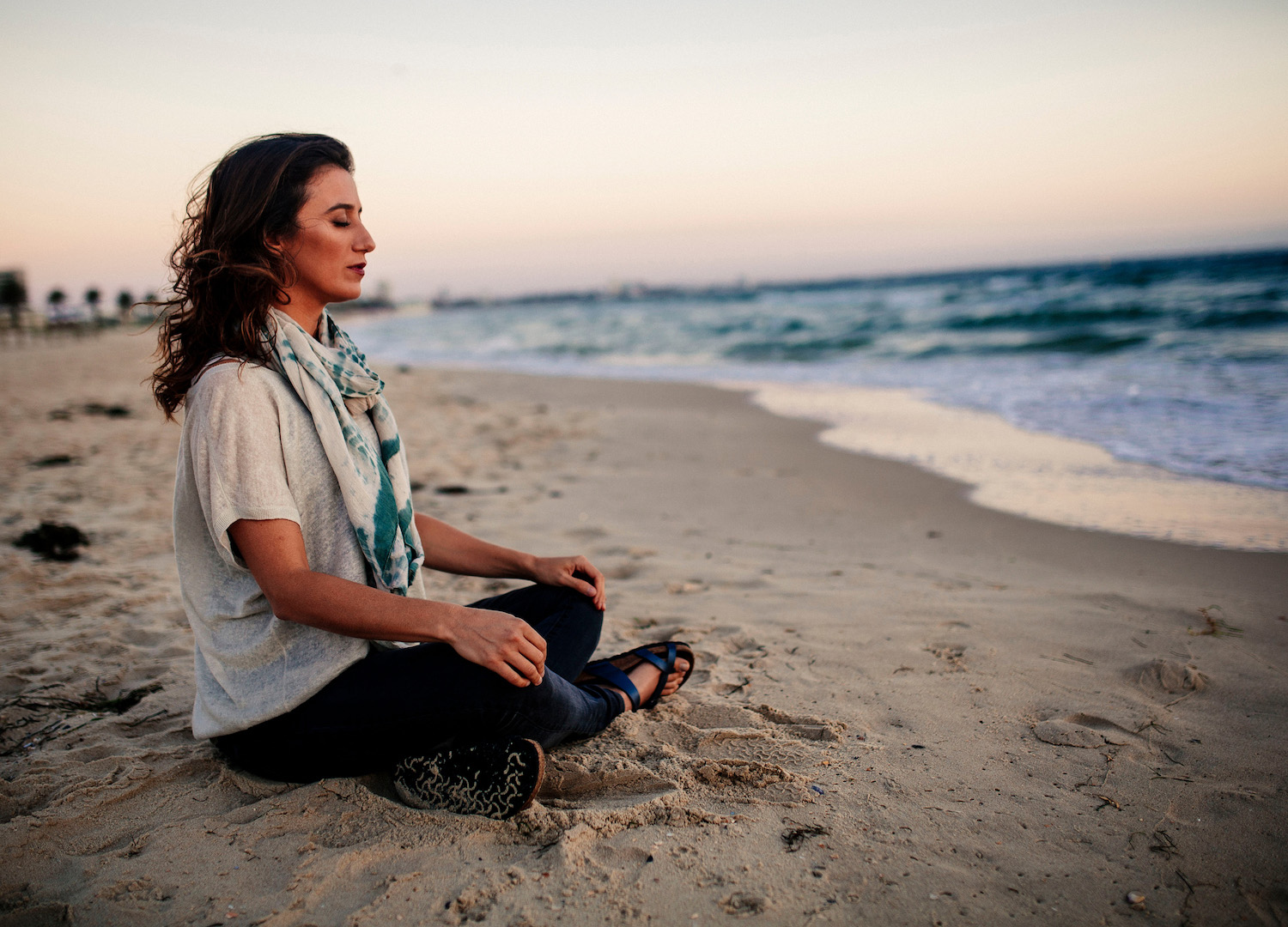
More Than Just Blissing Out Under a Mango Tree? Mindful in May Helps Us Press Pause
Feeling heavy about the state of the world? It seems Mindful in May has arrived at the perfect time as we approach the year’s mid-point, encouraging those of us feeling frazzled to take stock and breathe deep. But is mindfulness more than a fad? How can it help shield us from the trauma of our times? Mindful in May founder Dr Elise Bialylew helps us press pause.
What is Mindful in May?
Taking a pause is a radical act in this fast paced world. If you’ve had meditation on your list of things to do and would like to make a difference in the world at the same time, Mindful in May makes learning meditation easy and meaningful.
It’s a one-month online meditation campaign delivered to your inbox daily, to motivate you to bring a healthy mindful habit into your day. The campaign includes daily guided meditations, interviews with experts and cutting-edge science to keep you connected to your challenge.
While you learn to meditate and be mindful, your donation and fundraising will ripple across the world and help bring clean, safe drinking water to thousands of people living in the developing world.
Why were you inspired to start the campaign?
I’d been meditating for many years and was discovering that meditation was supporting me to live a healthier, happier life, supporting me to be more courageous and connected to myself and my purpose.
Although I knew meditation was so valuable, like many people, it was not uncommon for me to fall out of the routine especially at times of high stress, when I actually needed it the most. I imagined that there were many other people out there who felt the same way and I felt inspired to create a global community that could learn and practise doing something deeply worthwhile for ourselves and at the same time contribute to a greater cause through fundraising.
There are so many issues that need addressing in the world but I wanted to connect it to a global issue that could unite people all around the world. Water is one of our most basic needs and for one in nine people on the planet, it remains a daily struggle to access.
I had travelled in West Africa many years ago and during that time was deeply impacted by the extreme levels of poverty, people dying of treatable diseases often caused by water-related illnesses, and often struggling each day to meet their most basic survival needs.
Today, Mindful in May has taught thousands of people, from over 40 countries around the world, to meditate…We’ve raised over a million dollars for charity and transformed the lives of more than 30,000 people through funding clean water projects in villages across Africa.
In the developed world, we have so much, yet so many of us are unsatisfied, isolated and depressed and in parts of the developing world, people are living in community and struggling day to day with such profound levels of poverty. It made me think how can these two issues be addressed – bring more contentment, meaning and connection to those in the developed world, and support those in the developing world to get better access to their most basic needs like clean, safe drinking water. Mindful in May emerged as an answer to these two global issues.
Today, Mindful in May has taught thousands of people, from over 40 countries around the world, to meditate. We bring the world’s best meditation teachers together for a month of education, and inspiration to help you finally make meditation a habit. We’ve raised over a million dollars for charity and transformed the lives of more than 30,000 people through funding clean water projects in villages across Africa.
It’s incredibly humbling to be a part of so many people’s journeys as they work towards reducing the stress in their lives, strengthening their mental resilience, sleeping better and experiencing greater gratitude. Mindful in May is an opportunity to take positive action in your life AND make a difference to people’s lives who are in urgent need of clean, safe drinking water. It’s a clear mind for you and clean water for others.
READ MORE: How Owning Your Power Can Help Build a Better System From the Inside Out
Can you talk us through some of the scientific research surrounding mindfulness…
There is so much research that supports the power of mindfulness. Here are four scientifically supported ways that mindfulness meditation can support your physical and mental wellbeing.
ONE // Mindfulness has been shown to improve the immune system.
TWO // Growth in higher-functioning regions of the brain. A neuroscientist at Harvard University revealed a correlation between regular mindfulness meditation and growth in the thickness of the prefrontal cortex, a high-functioning area of the brain responsible for functions like focused attention and regulating our emotions.
THREE // Protection against age-related DNA damage. A groundbreaking study by Elizabeth Blackburn, PhD explored the effects of meditation on an enzyme in the body called telomerase, which functions to protect DNA from age and stress-related damage. Interestingly, telomerase was increased in the group of regular meditators, suggesting that meditation can protect the cells from age-related damage.
FOUR // Overall mental health is improved. A study by Teasdale and Segal revealed that mindfulness meditation could reduce the rate of relapse of depression by up to 44% in people who had suffered previous episodes. This effect was comparable with staying on a maintenance dose of antidepressants.
What do you think are some of the biggest misconceptions about mindfulness that still remain?
There’s many misconceptions around meditation that hold people back from experiencing its benefits. One of the most common myths is that you have to do a huge amount of meditation each day to get the benefits. It is true that much of the research in the field explores the impact of 30 to 45 minutes of meditation a day on physical and psychological wellbeing, and the more you meditate the greater the benefits. However, scientific research in collaboration with Monash University on the Mindful in May global online mindfulness program, suggested that just 10 minutes a day of mindfulness meditation over one month was enough to bring measurable benefits to participants lives including: a reduction in stress, an increase in focus and attention, reduced negative emotions, increased positive emotions and an increase in flourishing.
Is it more than a fad?
The popularity of mindfulness has been largely driven by the rapid growth of scientific research revealing what the Buddhist monks have known for generations but couldn’t measure with machines: meditation is a powerful tool for enhanced wellbeing and mental focus.
Mindfulness has certainly become a buzzword and although there are a lot of people jumping on the bandwagon, there are many others that think it’s just the latest passing fad. If I hadn’t studied the science, I’d be sceptical about its sudden popularity too. There is enough research to support the fact that this mental training can be profoundly transformative on a psychological, emotional and physical level. Technology is developing exponentially and at the click of a button we can access an infinite amount of information. With this privilege comes the potential cost of information overload, increased distractibility and low-grade background anxiety as we try to keep on top of things. Mindfulness is an antidote to this. It gives us a way to focus our attention and calm down our nervous systems that are on chronic overdrive.
It gives us a way to focus our attention and calm down our nervous systems that are on chronic overdrive.
How can mindfulness help us protect ourselves from the trauma of our times?
Just as we can physically train before a physical challenge like a marathon, we need to mentally train in order to build up our resilience muscles that can support us through the trauma of our times. Mindfulness helps us strengthen that ability to see our thoughts but not be completely hijacked by them. This is a particularly helpful skill when we have anxious or worried thoughts in the midst of challenging times. Resilience is something we can grow through practice and mindfulness is a powerful vehicle to greater resilience.
Just as we can physically train before a physical challenge like a marathon, we need to mentally train in order to build up our resilience muscles that can support us through the trauma of our times.
The loving-kindness practice is one specific type of meditation that has often been described as a practice that gives us some relief from states of fear and overwhelm. One study in Germany at the Max Planck Institute showed that after one day of practice, participants were better able to cope with watching distressing images on TV than they did before the training – and they coped better than a control group that did not receive the compassion training.
Loving-kindness meditation has also been shown to increase activation in areas of the brain associated with positive emotions like love, hope, connection and reward. As Buddhist monk Matthieu Ricard famously said, “Meditation is not just blissing out under a mango tree. It changes your brain and therefore changes what and who you are.”
What are your top five tips for incorporating mindfulness into our everyday lives?
Mindfulness is really about learning how to be present in our everyday lives and developing greater self awareness so we can make wiser decisions that ultimately support greater happiness. You can integrate mindfulness into day to day activities in some simple, but not “easy” ways. Here are a few ideas.
Be mindful in conversation
Use listening as a meditation. Pay attention to the person speaking. Notice the sound and rhythm of their voice and their facial expressions. Notice your mind drifting off into fantasy or thinking while the person is speaking. Notice your urge to speak, is it easier for you to listen or talk?
Be mindful when eating
Notice the food on your plate, pay attention to colours, shapes and smells. Bring awareness to the sensation of chewing and the flavours, textures and temperatures in your mouth. Notice any urge to eat quickly or swallow your food without chewing it completely. Be aware of the mind being hijacked from the experience of eating and gently bring it back to the direct experience of tasting your food.
Be mindful in supermarket queues
Check in with how you’re feeling, notice any irritation or impatience in the body and, using the breath, see if you can let it go. Tune in to the body. Sense your feet on the ground, the sounds around you and your breath. Take a moment to remember that every other person in the queue has their own story, their own challenges and hopes. Take a moment to silently send them a good wish, focussing your attention on cultivating a positive emotion, rather than standing in impatience and tension. Research from Barbara Fredrickson has shown that cultivating positive emotions positively impacts our physical health.
Be mindful on social media
Before checking your Facebook or Twitter, bring conscious attention to the amount of time you intend spending on social media. Notice the urge to keep checking and scrolling through the feed. Notice any emotions that arise as you experience other people’s lives. Be mindful how you are using technology and the impact it is having on you.
Be mindful while driving
Driving can be a hectic, rushed experience. Try and use driving as an opportunity to practise mindfulness, bringing your attention into the present moment by unhooking from thoughts and bringing your awareness into the body. Notice your hands on the wheel, feel your posture. Notice any tension in the body and actively relax the body, let your shoulders be soft. Try turning off the radio and sitting in silence. Bring your attention to the breath and count 10 breaths using driving as an opportunity to reconnect with yourself and shift the body into greater calm.





